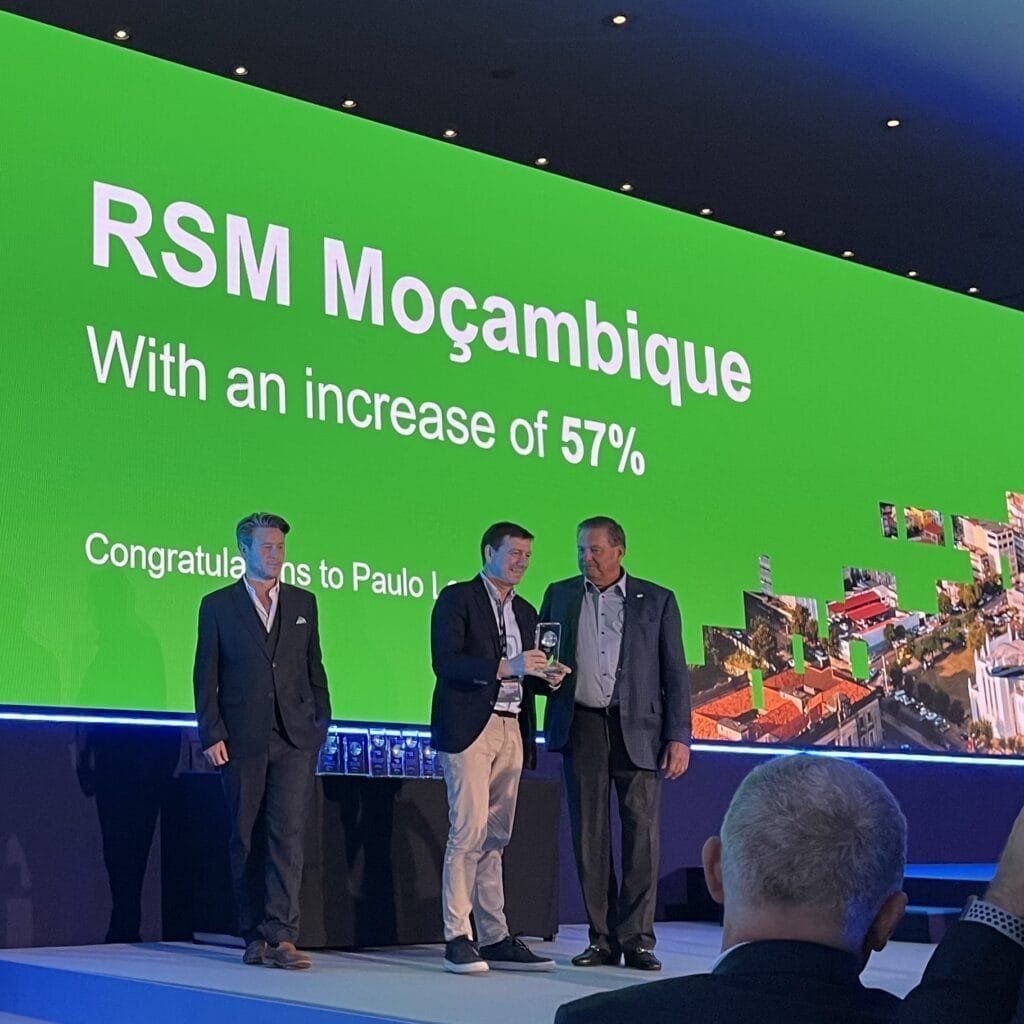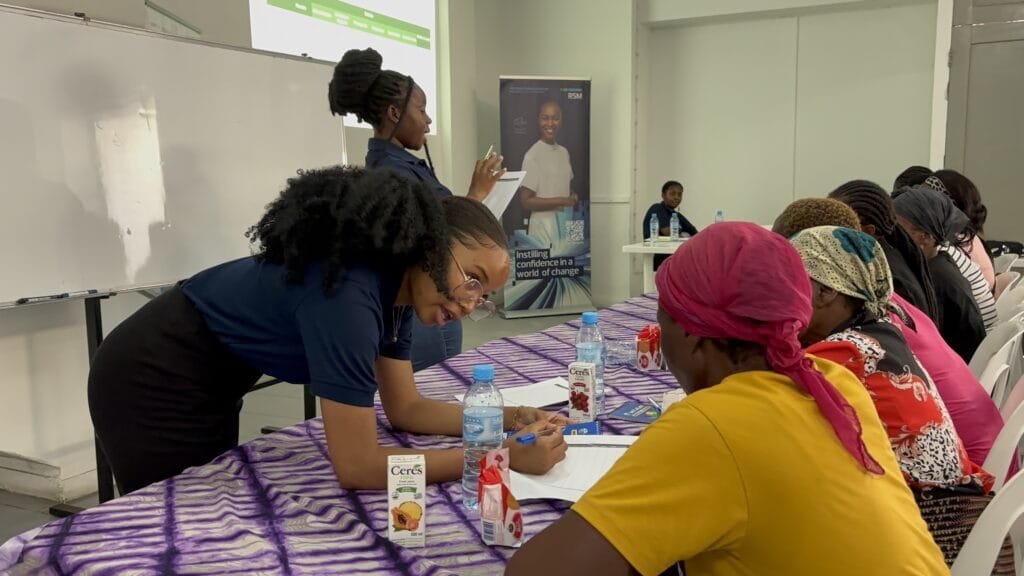PROFILE Mozambique: RSM Mozambique is a global reference in Assurance, Tax & Consulting, with an experienced team and a client-centric approach. Could you begin by briefly explaining RSM Mozambique’s market positioning and the type of companies you serve?
Edite Félix: RSM Mozambique is a member firm of RSM International, one of the world’s largest networks in audit, consulting, and tax, with a consolidated presence in more than 120 countries. In Mozambique, we are nationally recognized in the provision of Assurance, Tax & Consulting services, offering integrated solutions of high technical precision, designed to generate real impact on the business environment.
We mainly serve medium to large-sized companies, both national and international, that are not merely seeking compliance, but a strategic partner capable of understanding their specific challenges, anticipating operational and regulatory risks, and delivering sustainable value.

Our market positioning rests on three fundamental pillars: quality, consistency, and client proximity. For us, quality is not just a guiding principle, it is the very foundation of our business model. This culture of excellence attracts companies with high governance standards, retains qualified talent, and sustains our reputation as a trusted firm in Mozambique’s business ecosystem.
PM: Which sectors dominate your portfolio? What specific challenges do they pose, and how is RSM positioned to respond to them?
EF: Our portfolio comprises sectors of high complexity and strategic relevance to Mozambique’s economy. We work with banks and insurance companies, where regulatory requirements are particularly demanding and compliance is an ongoing priority. In these cases, our commitment is to ensure that our clients operate in full compliance, minimizing risks and ensuring the strength and integrity of their control systems.
In the oil and gas sector, our work requires deep expertise in international taxation, technical reporting, and risk management, in an area where transparency and precision are especially critical. We also advise non-governmental organizations and multilateral agencies, whose operating criteria demand rigorous project impact evaluation, transparent accountability, and alignment with international auditing and reporting standards.
In addition, we serve large national and multinational private companies operating in growth sectors such as agribusiness, energy, and infrastructure, all of which require complex strategies around governance and sustainable growth.
PM: RSM International’s latest report highlights a 29% growth in Africa, partly driven by Mozambique. How does RSM Mozambique fit into the global growth strategy?
EF: The 29% growth recorded by RSM in Africa, as noted in the most recent global report, confirms that emerging markets now play a central role in our network’s global strategy. In Mozambique, we are proud to contribute actively to this performance with a business model centered on technical excellence, the development of local talent, and the adoption of innovative solutions.

We align with RSM’s 2030 Global Strategy, which emphasizes innovation, sustainable growth, and real impact. Nationally, this vision translates into the progressive digitalization of our services, the strengthening of our client base, and the positioning of Mozambique as a strategic hub for international operations, especially in areas such as transfer pricing and development consulting. We are also committed to reinforcing regional ties, particularly with SADC and East African countries, consolidating RSM Mozambique as a center of excellence for business expansion on the continent.
PM: In 2024, RSM launched the RSM Luca platform for digital auditing. How has this innovation been implemented in Mozambique, and what has been its impact on client service?
EF: The introduction of the RSM Luca platform in Mozambique in 2024 marked a new chapter in how we conduct audit projects. It is a fully digital ecosystem designed to enhance the efficiency, transparency, and quality of our services. Its implementation was carefully structured, with intensive training for our teams and full integration into our workflows.
The results are already evident, we’ve seen greater process agility, reduced manual and repetitive tasks, more robust risk management, and more direct collaboration with clients. The major advantage of RSM Luca is that quality is no longer dependent solely on supervision, it is embedded in every phase of the project, from planning to final delivery. This evolution reinforces our commitment to technical excellence and to providing services increasingly aligned with both the Mozambican context and international standards.
PM: The 2030 Global Strategy places growing emphasis on people and technology. How do you attract and retain talent in the Mozambican market? Are there internal initiatives such as 360° feedback or innovation programs?
EF: At RSM Mozambique, we firmly believe our greatest asset is our people. That’s why we invest strategically and continuously in attracting, developing, and retaining talent. Our value proposition is anchored in clearly defined career plans, transparent and structured progression paths, active mentoring by experienced leaders, continuous training programs, both national and international, and structured evaluation mechanisms, such as the 360° feedback system, periodic reviews of job descriptions, and performance models.

We also foster a culture of excellence and responsibility, where every employee sees themselves as an ambassador of the RSM brand in every engagement. Our commitment is to develop professionals with ambition and a sense of mission, fully aware that today’s talent is tomorrow’s partner, responsible for ensuring the firm’s quality and sustainable growth. This alignment with the 2030 Global Strategy strengthens our role as a reference in human capital within Mozambique’s audit, tax, and consulting sector.
PM: Your teams are increasingly investing in technology, digital audits, and data-driven analysis. What are the main technical challenges you face locally, and what solutions are on the horizon for 2025/26?
EF: The technical challenges we face in the local context are essentially centered on three strategic axes: the still limited digital infrastructure, the ongoing need to upskill our teams to master new tools, and the varying degrees of client adaptation to integrated digital solutions.
To address this, we have consistently invested in technological innovation. We are accelerating the integration of tools such as artificial intelligence, Power BI, CRM, Caseware, and even resources like ChatGPT, aiming to strengthen analytical precision and real-time responsiveness. At the same time, we are automating critical processes, particularly in compliance, onboarding, and project monitoring, promoting greater operational efficiency.
On the internal development front, we maintain ongoing technical training programs, with a strong focus on digital skills and new technologies. Our ambition for 2025/26 is clear, we aim for fully digitalized processes, with artificial intelligence integrated from proposal to final delivery. This will help us ensure consistency, raise our quality standards, and deliver even greater real value to our clients.
PM: Given your mission to enhance transparency, efficiency, and best practices in both business and institutional sectors, how do you view RSM’s impact on Mozambique’s sustainable growth?
EF: At RSM Mozambique, we strongly believe our role goes far beyond delivering technical services. We see our work as an active contribution to the country’s sustainable growth, through the promotion of transparency in business and institutional sectors, the strengthening of management and compliance best practices, and technical support to key structural projects in areas such as energy, agriculture, and public finance.
We are also committed to building the capacities of Small and Medium Enterprises (SMEs) and Non-Governmental Organizations (NGOs), which often play a critical role in job creation and economic inclusion. We believe that a more ethical, efficient, and transparent economy is also more resilient and more attractive to both national and foreign investment.




